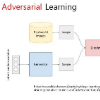Deep learning solutions are instrumental in cybersecurity, harnessing their ability to analyze vast datasets, identify complex patterns, and detect anomalies. However, malevolent actors can exploit these capabilities to orchestrate sophisticated attacks, posing significant challenges to defenders and traditional security measures. Adversarial attacks, particularly those targeting vulnerabilities in deep learning models, present a nuanced and substantial threat to cybersecurity. Our study delves into adversarial learning threats such as Data Poisoning, Test Time Evasion, and Reverse Engineering, specifically impacting Network Intrusion Detection Systems. Our research explores the intricacies and countermeasures of attacks to deepen understanding of network security challenges amidst adversarial threats. In our study, we present insights into the dynamic realm of adversarial learning and its implications for network intrusion. The intersection of adversarial attacks and defenses within network traffic data, coupled with advances in machine learning and deep learning techniques, represents a relatively underexplored domain. Our research lays the groundwork for strengthening defense mechanisms to address the potential breaches in network security and privacy posed by adversarial attacks. Through our in-depth analysis, we identify domain-specific research gaps, such as the scarcity of real-life attack data and the evaluation of AI-based solutions for network traffic. Our focus on these challenges aims to stimulate future research efforts toward the development of resilient network defense strategies.
翻译:暂无翻译



